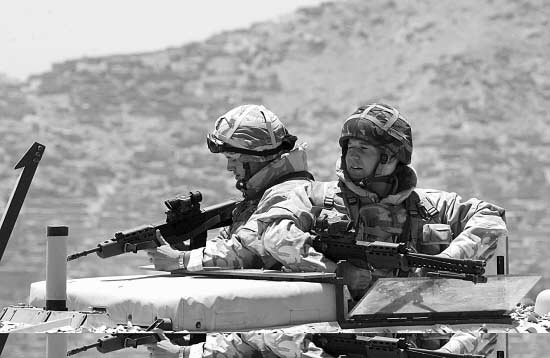 |
|
|
|
双语世界新闻:北约上空阴影笼罩(图)http://www.sina.com.cn
2007年10月23日 10:12 钱江晚报
 阿富汗地区的国际部队
The NATO alliance likes to boast it has won every battle in Afghanistan, forcing the Taliban to resort to “asymmetric” suicide bombings. Perhaps. But NATO is far from winning the war, and the ragged Afghan insurgents seem to have more staying power than the West's mighty alliance. As defence ministers prepare to meet in the Netherlands on October 24th, NATO itself is looking shaky. Last year, when southern Afghanistan erupted in intense violence, NATO asked for more troops and said the contingents already there should do more to help the countries leading the combat, mainly America, Britain and Canada. This year, with casualties higher than in 2006, NATO's concern is no longer to increase its strength but to stop some allies from withdrawing altogether. The Dutch centre-left coalition government is prevaricating over whether to extend the mission of its troops beyond 2008. It wants to find another country with which to share the burden of securing the restive province of Uruzgan. In Canada, the minority conservative government of Stephen Harper is under pressure from all three opposition parties—Liberals, Bloc Québécois and the New Democrats—to withdraw its soldiers by February 2009. Canada provides the main force in Kandahar. On October 16th the government said troops should stay in Afghanistan until 2011, although it was unclear whether they would remain in a combat role or scale back to a training mission. Four days earlier, Mr Harper had appointed a special panel to draw up by February 2008 non-binding recommendations for the mission's future. After a heated debate, the German parliament voted this month to maintain its troops for another year. In Italy the debate over its contingent has been re-opened by the kidnapping last month of two Italian intelligence agents, one of whom was fatally wounded in a rescue operation. Just as NATO is vital to Afghanistan, so Afghanistan is vital to NATO. General Dan McNeill, the American commander of ISAF, has given warning that the alliance's future is at stake in the country. He said the allies had the “upper hand”, but did not have enough forces, whether foreign or Afghan, to hold on to all the ground they wrest from insurgents. 双语世界新闻:北约上空阴影笼罩(图) 北约联盟喜欢吹嘘说在阿富汗赢得了每一次战斗,并迫使塔利班采取“非对称”的自杀式爆炸战术。也许是这样,但是北约远没有赢得这场战争。衣衫褴褛的阿富汗反叛者似乎比强大的西方联盟更有生存力。 当国防部长们准备于10月24日在荷兰聚会之际,北约本身看上去也不稳定。去年,当阿富汗南部地区爆发严重的暴力冲突,北约要求成员国派遣更多的部队,并说已有的部队应该采取更多的行动以帮助主导战斗的国家,这些国家包括美国、英国和加拿大。今年,随着伤亡人数超过2006年,北约关注的已经不再是加强力量,而是阻止一些盟国全面撤军。 荷兰中间偏左的联合政府在2008年以后是否延长部队的使命这一问题上态度不明。它希望找到另一个国家来分担稳定难以控制的乌鲁兹根省的负担。 在加拿大,斯蒂芬·哈珀的少数派保守政府面临着自由党、魁北克人集团和新民主党三个反对党的压力,他们要求到2009年2月撤出加拿大部队。坎大哈的主要军事力量是由加拿大提供的。政府10月16日说,他们的部队在阿富汗应待到2011年,尽管还不清楚仍将执行战斗任务还是降格为训练任务。4天前,哈珀先生指定了一个特别小组,在2008年2月底前为加拿大驻阿部队的未来起草非约束性的建议。 经过激烈的辩论,德国议会本月通过投票,决定部队继续留驻一年。在意大利,由于上个月两名特工被绑架而重开有关派遣部队的辩论。其中一名特工在救援行动中受重伤。 就像北约对于阿富汗来说是至关重要的,阿富汗对于北约也是至关重要的。国际安全援助部队美国司令官丹·迈克尼尔将军已经发出警告说,盟军在这个国家的未来处于危机中。他说,联军已经占据上风,但是没有足够的力量,无论是外国部队和阿富汗部队来控制从反叛者手中夺取的所有地方
【发表评论】
不支持Flash
|
||||


